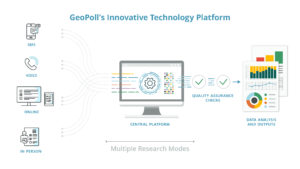- Contents
The proliferation of digital technology has enabled corporations and market researchers to condense the traditional research lifecycle of planning, design, collection, analysis, and presentation. Rather than bookending studies by defining a static set of questions at the front end and answering those questions decisively after a prolonged process at the back end, researchers can leverage agile research tools and methodologies to test, refine, and retest questions and hypothesis on an ongoing basis. They can use the research data as it is collected to revise the wording of questions, discard questions that are not yielding relevant insights, or add new questions. This continual validation of the direction and scope of the study helps ensure that both the immediate and cumulative results are relevant.
Although not every project lends itself to an agile approach, the space and demand for more nimble research is growing. In this post, we explain the methodologies, benefits, and applications of agile market research.
What is Agile Market Research?
The “agile” approach was created by software developers and is distinguished by its iterative nature. While in the traditional development approach the full parameters and scope of a project are defined upfront and executed straight through to product launch, the agile model starts small and proceeds in stages or “sprints,” with the outcome of each sprint informing the design and development of the next.
 By continuously evaluating requirements, plans, and results, agile developers are able to catch errors and make changes quickly, ultimately shortening time to deployment and improving quality.
By continuously evaluating requirements, plans, and results, agile developers are able to catch errors and make changes quickly, ultimately shortening time to deployment and improving quality.
Agile market research applies agile software development methods to the practice of market research. For years, market researchers have been pressed to deliver insights faster while maintaining the quality of data collected. Instead of waiting weeks or months to find out how consumers feel about their brand, ad, or products, companies want answers in hours or days. To meet these demands, insights teams are increasingly adding agile methodologies to their research toolkit.
To be clear, agile means more than just fast. The agile approach focuses more on efficiency and effectiveness than speed. It leverages technology to gather feedback quickly and iteratively throughout the research process. Stakeholders can test and learn in real-time whether questions, hypotheses, target audiences, concepts, ads, etc., are working or not and make changes or decisions before committing further time and effort in any one direction.
By absorbing the learning as the study moves along, stakeholders are better positioned to make swift, decisive actions than if they try to digest all the data and insights at the end.
Agile Market Research Application
Agile research methods work best for studies that are tightly focused and clearly defined. Instead of conducting a few large market research campaigns per year that take a lot of time to develop and execute, teams who employ agile market research methodologies conduct smaller-scale and more focused projects as often as needed. Projects with broad objectives or multiple agendas are often better served by a more traditional approach.
Starting small with tightly focused objectives enables researchers to map the iterative process in a way that precisely outlines the sprints but leaves the content of each one flexible. This provides leeway to continually tweak the specifics to incorporate the learnings from each cycle as the study unfolds (e.g., adding questions, rewording questions, altering the concepts/ads tested, etc.).
Adopting Agile Market Research Methodologies
The shift from traditional research methods to an agile approach can be a significant undertaking. Within an organization, it often requires stakeholders to be more involved throughout the research process. Rather than handing the specs to the research team and waiting for the insights, stakeholders should be prepared to engage with the findings during each sprint, consulting with the research team about what is learned and what it means for the next round.
Adopting agile methodologies can also require an adjustment in the tools used to conduct and share research. Whether teams are adding new technologies or vendors or simply deploying their existing solutions in different ways, agile research requires tools that enable teams to collect data, analyze it, and report findings quickly and efficiently.

Automated platforms and AI offer significant advantages for increasing the speed and flexibility of the entire research process, from project design through final analysis and reporting. Online dashboards enable stakeholders to stay involved throughout the process by providing real-time visibility into the research findings.
Conduct Agile Market Research with GeoPoll
GeoPoll is the pioneer in conducting remote research through mobile-based methodologies in Africa, Asia, and Latin America. Our central technology platform, multiple research modes, quality control processes, and interactive data dashboards deliver reliable, robust data and analysis to clients around the globe in real-time. To learn more about our research capabilities and agile methodologies, contact us.
